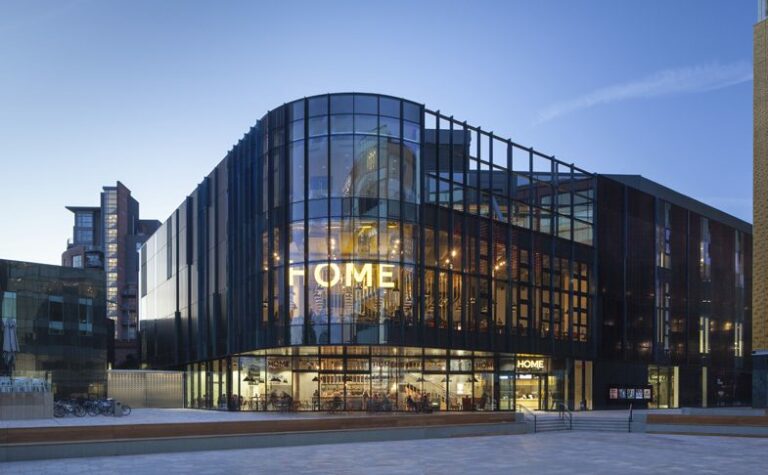Should brand owners remain ‘politically neutral’ when it comes to global conflicts? If they don’t, they risk “alienating” some customers, argues Sean O’Meara, founder of Essential Content.
It follows a developing story over the past week where Manchester culture organisation HOME, has been grappling with backlash over its initial decision to cancel a Palestinian literature event.
Voices of Resilience, an event showcasing the work of Palestinian writers, was cancelled by the venue citing “safety” concerns and “recent publicity” following a letter issued by the Jewish Representative Council of Greater Manchester (JRCGM)
The letter, seen below, alleged one of the people featured in the event, Atef Abu Saif, had engaged in “shocking” and “antisemitic Holocaust denial”.
We have today written to @HOME_mcr and @MCRCityofLit in relation to their "Voices of Resilience" event scheduled to be held on April 22. This event must be cancelled.
— Jewish Representative Council of GM & Region (@JewishMCR) March 27, 2024
The event features the work of Atef Abu Saif, the Palestinian Authority Minister of Culture, who has engaged in… pic.twitter.com/9S3JJkiJs0
HOME’s decision prompted almost 600 artists, performers and workers to sign an open letter, including Maxine Peake who was set to appear at Voices of Resilience, urging the venue to reinstate the event.
By cancelling the event, the open letter said HOME had contributed to the “silencing of Palestinian voices at a time when they most need to be heard” whilst criticising the venue’s claims of being a ‘politically neutral space’.
The event’s organisers, Comma Press, issued a statement at the time saying it was disappointed with HOME’s decision and strongly refuted the allegations of antisemitism with examples in support of Atef Abu Saif.
After a cohort of artists removed their work from an exhibition at the venue, in protest over the cancellation of the event on 3 April, HOME later issued a statement on 4 April to advise the event will now be reinstated.
In a flurry of further statements from all directions, Comma Press welcomed the decision and said it still has “faith in Manchester as a radical place”. Meanwhile, the Jewish Representative Council of Greater Manchester noted its “dismay” over the u-turn.
‘We still have faith in Manchester as a radical place.’
— Comma Press🍉 #CeasefireNow (@commapress) April 4, 2024
Read our statement on the reinstated ‘Voices of Resilience’ event @HOME_mcr here 👇https://t.co/tO2AOrHd5j
The importance of comms and how the row unfolded
Sean O’Meara, a Manchester-based crisis and issues management consultant and founder of communications agency Essential Content, explains the importance of solid comms when it comes to dealing with conflicts.
“Setting aside the moral complexities around whether or not to cancel the event, the comms around this have been far from solid. Unfortunately for the leadership at HOME, a number of key stakeholders and groups appear to have lost confidence in them as an institution.
“They’ve managed to alienate both those who were in favour of cancelling the event and those opposed to it. The media reports and timeline make it look like HOME has been consistently taken by surprise by events that were entirely predictable.”
But how did the row unfold through the lens of a crisis consultant?
“The problems stem from unclear and insufficiently explained decision making and an apparent lack of clarity around their own organising principles. Their original statement contained a claim that they were a ‘politically neutral space’,” he says.
“It’s functionally impossible for a progressive arts institution to be ‘politically neutral’ without becoming exceptionally boring or censorious. But that claim can’t be taken back, it’s there in black and white, and it will come back to haunt them. The next time HOME hosts anything remotely contentious or controversial, would-be critics simply have to hold up that statement to highlight the incongruence.”
In HOME’s statement about reinstating the event, the theatre said it had “reached out to partners in the city” and had been “able to access additional resources that will support us delivering the event”.
“This tells me that they were very much on the back foot, making hasty, reactive decisions in the moment,” says O’Meara.
“I’d never recommend to a client that they ‘outsource’ policy design to any external partner. Especially in a crisis like this. As someone who supports organisations trying to communicate through a crisis, it seems to me that Home’s leadership has been hamstrung by the absence of a robust plan.
“You can’t plan for every flavour and variety of crisis, but with a comprehensive risk register and policy framework, it should be possible to respond to criticism in a credible and consistent manner.”
Aside from HOME’s internal dilemma, should brands or creative organisations remain ‘politically neutral?
“For brands, organisations and public institutions, having a political stance one way or the other is inherently risky and will necessarily lead to them alienating a segment of their addressable audience. To blend politics, activism and advocacy into brand values, comms leaders need to accept ahead of time that they will alienate people and they need to be OK with that, for better or worse.
“Ben & Jerry’s and Patagonia are two examples of brands who marry politics and business and do it with a consistent set of core values. It’s rare to see these sorts of brands u-turning in the way Home has because they’ve put in a lot of work to develop their guiding principles.”
O’Meara issues some words of advice for HOME and brand owners that may end up in a similar position.
“My advice to Home would have been to accept that they are not, and can’t be, politically neutral, and to plan in advance for the risks that come with that. My advice to brand owners is always to remain as politically neutral as possible, unless they are prepared to accept that they will alienate a segment of their potential customer base.”










